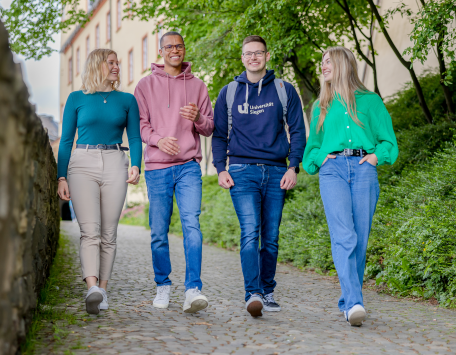Shape Your Future, Starting in Siegen
In the master’s in media culture, you will take a research-driven approach to understanding today’s media landscape—from film and photography to games, social media, and artificial intelligence. This includes digital platforms and interfaces alongside social movements and emerging technologies such as the Internet of Things. The program connects cultural, aesthetic, social, and technological perspectives, grounded in contemporary theory and innovative methods. You will also gain the expertise to design and conduct independent research projects that address the complexity of media in the modern world.
Career Prospects
If you’re passionate about understanding media through research and innovation, the Master’s in Media Culture is your gateway to making an impact. This program not only prepares you for advanced doctoral study but also equips you with the skills needed for dynamic roles in the media industry. Whether you want to shape editorial content, develop creative concepts, advise media companies, or analyze the latest digital media trends and technologies, this degree empowers you to lead and innovate in today’s rapidly evolving media landscape.
- Bachelor's degree in media studies or
- Completed first professionally qualifying university degree in a comparable course of study. Students must provide evidence of good knowledge — at least 18 credit points (CP) — in the areas of media theory, media history, and media aesthetics or analysis. Where there are gaps in the prior knowledge, these can be made up by the end of the 2nd semester (full-time studies) to a maximum of 9 CP, according to the specifications of the Examination Board.
In addition, a minimum grade of good (2.5) is required for the admission procedure.
The current examination regulations always apply.
Examination Regulations, Including degree plans and module descriptions
Framework Examination Regulations (RPO-M) and Departmental Examination Regulations (PHIL-FPO-M) define the general framework conditions for studying in Siegen and within Faculty I: Faculty of Arts and Humanities.
In addition, the Departmental Examination Regulations for the individual degree programs and degree components (FPOs) define the basic structures of each individual degree program and degree component (such as admission requirements and curriculum). The departmental examination regulations are accompanied by model course sequences, which represent the recommended course of study for the individual subjects, as well as module descriptions (content-related information on modules).
The current version of an FPO automatically applies to students when they enroll for their first semester.
Who choose Media Culture at the University of Siegen?
- Conduct independent and innovative design research projects
- Gain an in-depth understanding of media cultures in the digital age
- Develop an analytical and reflective perspective on media practices
- Benefit from close mentorship and small-group learning environments
- Engage in a research-driven course of study



